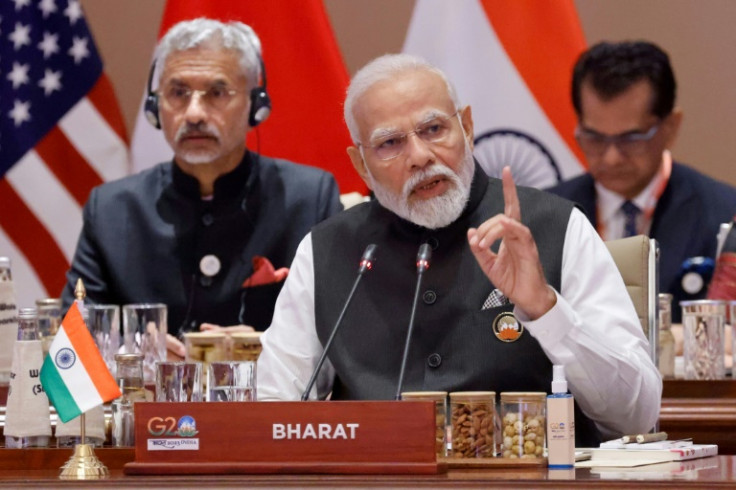G20 Summit adopts New Delhi Declaration amid Ukraine text controversy
The G20 Summit in New Delhi successfully adopted the Leaders' Declaration after addressing Ukraine text concerns, marking India's ambitious presidency.

In a pivotal moment for India's G20 presidency, the New Delhi Leaders' Summit Declaration was successfully adopted on Saturday after intense negotiations and revisions concerning the Ukraine issue.
The G20 member states, representing a diverse range of interests and perspectives, managed to find common ground and reach a consensus, marking a significant achievement for international diplomacy.
The announcement came during the second session of the Summit held at the prestigious Bharat Mandapam, where Indian Prime Minister Narendra Modi addressed the gathered leaders and delegates.
With evident pride, Prime Minister Modi conveyed the breakthrough: "Have just got the good news that due to the hard work of our teams and your cooperation, a consensus has been reached on the New Delhi G20 Leaders Summit Declaration."
Modi's proposal for the adoption of the G20 declaration was met with unanimous approval from the member states, culminating in the formal adoption of the New Delhi Declaration.
In his statement, Modi expressed his gratitude, saying, "On this occasion, I would like to thank our ministers, sherpas, and all officials who made this possible with their hard work."
Highlighting the exceptional nature of India's G20 Presidency, Prime Minister Modi asserted: "India's G20 Presidency has been the most ambitious in the history of G-20. With 112 outcomes and presidency documents, we have more than doubled the substantive work from previous presidencies."
This statement underscored India's commitment to facilitating meaningful discussions and tangible outcomes during its term at the helm of the G20.
However, the road to consensus had not been without its challenges. The contentious issue of Russia's war in Ukraine had cast a shadow over the negotiations, making it difficult for member countries to find common ground.
During the G20 Sherpa meeting held in Haryana from September 3rd to 6th, negotiators struggled to reach a consensus on the text addressing the Ukraine issue. The possibility of the summit ending without a joint declaration loomed ominously. To avert this outcome, India took the initiative by introducing a new paragraph addressing the Ukraine conflict.
"The Indian side circulated the draft paragraph on the Ukraine issue among the other G20 members this [Saturday] morning. It is now being considered by the other states. Some countries have no problem with the wording," revealed an anonymous source from a G7 state.
The circulation of this new text marked a turning point in the negotiations, opening the door to potential agreement.
Furthermore, two representatives from G20 member states confirmed that the draft paragraph on Ukraine had been distributed among all member states for discussion in an effort to break the deadlock. The discussions were described as "tough", highlighting the contentious nature of the Ukraine crisis as the primary hurdle to achieving a consensus on the draft leaders' declaration.
While the Indian side vigorously pushed for the draft paragraph's acceptance by all member states to ensure the summit's success, it was acknowledged that further deliberations might be necessary to finalise the text.
Exploring the Delhi Declaration
In the wake of ongoing challenges surrounding the Ukraine conflict, India took a proactive step to advance negotiations by distributing a draft Summit Declaration to member countries, notably excluding the contentious paragraph on geopolitics. This move, reported by news agency PTI, aimed to facilitate constructive discussions and drive a positive outcome for the G20 Summit.
The Delhi Declaration places significant emphasis on fostering robust, sustainable, balanced, and inclusive global growth. This focus on inclusivity and sustainability is especially crucial given the backdrop of the Russia-Ukraine conflict, which has generated a complex geopolitical landscape.
Key highlights of the Delhi Declaration:
- Respect for territorial integrity: The document unequivocally states that all nations must abstain from employing threats or force to acquire territory, recognising the paramount importance of safeguarding territorial integrity, sovereignty, and political independence.
- Combatting terrorism: The declaration underscores the grave threat posed by terrorism to international peace and security. It categorically asserts that all acts of terrorism, regardless of their motivation, are criminal and unjustifiable, regardless of when, where, or by whom they occur.
- Promoting equity and stability: The Delhi Declaration places a strong emphasis on protecting vulnerable populations by promoting equitable growth and enhancing macroeconomic and financial stability.
- Sustainable growth: The document prioritises the pursuit of robust and sustainable growth, with a commitment to accelerating progress towards achieving sustainable development goals. It also champions the concept of a green development pact and advocates for the revitalisation of multilateralism.
- Fairtrade commitment: The New Delhi Leaders' Declaration highlights the commitment of G20 member countries to foster unrestricted, open, and equitable trade, particularly in the fields of agriculture, food, and fertilisers. Moreover, member states pledge to abstain from imposing export restrictions.
- Global health strengthening: G20 nations reiterate their dedication to bolstering the global health architecture. This involves enhancing the resilience of health systems and supporting the development of climate-resilient and low-carbon health systems, often in collaboration with multilateral development banks (MDBs).
- Climate finance and alignment: The declaration underscores the imperative of aligning financial flows with climate objectives while simultaneously expanding financing, capacity-building, and technology transfer. A special focus is placed on addressing the specific priorities and needs of developing countries in this context.
© Copyright IBTimes 2024. All rights reserved.






